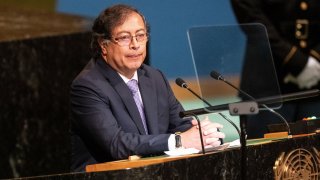Gustavo Petro’s Anti-Israel Fantasy Has a High Price for Colombia
The Colombian president's severing of diplomatic relations with Israel will terminate a budding bilateral partnership.
Revolutionary rhetoric feels good—just ask encampment activists across U.S. college campuses whose righteous rage turned their college quads into mini-Woodstocks. But governing a country requires more sober-minded calculations. Colombia’s president, Gustavo Petro, is about to find out. On Wednesday, in a raptured moment of revolutionary enthusiasm before a crowd assembled to celebrate “International Workers Day” on May 1, Petro declared that Colombia would sever diplomatic relations with Israel.
Petro’s announcement hardly comes as a surprise. Since the October 7, 2023, Hamas massacre of more than a thousand Israeli civilians, Petro has refused to condemn Hamas and has instead blamed Israel, repeatedly accusing Israel of genocide and likening it to Nazi Germany. His decision follows months of inflamed rhetoric, gradual degrading of diplomatic ties, and public spats with Israel’s ambassador in Bogotá and reflects Petro’s flirtation with the axis of anti-Western authoritarian powers like Russia, China, Iran, and Venezuela.
There is a price tag to this decision, though: Colombia is jettisoning a trade and security partnership that gave Colombia much needed access to advanced weaponry for its security, advanced technology for its technological development, and advanced know-how for its agricultural sector.
The biggest losers stand to be Colombia’s armed forces. With dissident guerrillas still at war with the state, areas overtaken by organized crime, and instability across its borders, Colombian armed forces may struggle as they scramble for alternative suppliers. This will not be trivial. Colombia’s fighter jets are Israeli-made Kfirs. Light arms are produced in Colombia under Israeli license. Colombia had just awarded Israel a major contract for air defense systems before this crisis. Now, Petro will have to procure much-needed military hardware elsewhere.
The business sector will also suffer. Israel and Colombia implemented a free trade agreement in 2020, the impact of which, especially for Colombia, was extremely beneficial. Colombian exports to Israel rose from $274 million in 2010, right before negotiations began, to $1.08 billion in 2022. Israeli exports were much lower but still significant and advantageous for Colombia. Agriculture, too, was poised to greatly benefit from Israeli investment and know-how under the new FTA. Petro has thrown all that into turmoil now.
The reason for the anti-Israel turn comes down to Petro’s indulgence of his radical revolutionary nostalgia. Petro is an old revolutionary whose past as a member of Colombia’s M-19 guerrilla organization still informs his worldview. He recently took pride in the fact that M-19 guerrillas trained in the Libyan desert shoulder to shoulder with PLO and Polisario rebels, back in the day when Libya’s strongman, the late Colonel Qaddafi, financed and trained anti-Western armed revolutionaries in his own hosted terrorist training camps. Petro, who said that “we were there together touching the stars in the desert,” essentially explained his foreign policy as a romantic throwback to his revolutionary past.
Petro’s romantic worldview may earn praise from a Frantz Fanon reading group, but it will not deliver to his country. He is sacrificing Colombia’s national interest on the altar of the anti-Western party line, whose authoritarian backers are hardly iconic humanitarians.
And it is not just Israel, the favored target of righteous leftists.
Under Petro, since 2022, Colombia has recognized Polisario, the Algerian and Iranian-backed guerrillas fighting Morocco in the Western Sahara, again evoking their history of joint struggle as his reason. Colombia has also sought a realignment with Nicolas Maduro’s Venezuela and to boost bilateral trade.
Petro is not the only Latin American leader who has taken a hostile stance against Israel since October 7. Brazil’s Luis Ignacio Lula da Silva and Chile’s Gabriel Boric, too, have downplayed Hamas’ atrocities while stigmatizing Israel’s response. Both, however, have limited their responses to inflammatory rhetoric and have refrained from matching it with actions ultimately harmful to their country’s interests.
Petro, on the other hand, has put struggle before country. It will cost him—and his countrymen.
Emanuele Ottolenghi is a Senior Fellow at the Foundation for Defense of Democracies, a Washington, DC-based nonpartisan foundation engaged in research on national security and foreign policy. Follow Emanuele on X @eottolenghi.
Image: Lev Radin / Shutterstock.com

